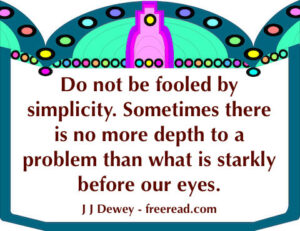
Power of the Presence
I told readers that I would give Eckhart Tolle a fair examination. In addition to the two books I have read I ordered the “Power of the Presence” on 6 audio CD’s. I thought I was ordering an audio book, but what it turned out to be was a live recording of a seminar he gave, or “retreat” as he called it.
I just finished listening to it a few minutes ago.
I’m kind of glad I got this selection as he reveals his personality in a personal presentation whereas he is fairly dry when he just reads his books.
He’s got kind of a cute, cuddly innocent personality. Instead of being the type of guy you’d like to have a beer with Tolle is more the type you’d like to play checkers with or maybe a game of gin rummy. Anything too heavy on the thinking or heartiness of the moment would seem out of place.
Most of the time he talks in a low fairly hypnotic cadence. I had to turn the volume to its maximum to hear him on my iPod. I don’t think he has any sinister motive to influence his audience through hypnosis — it’s just his style. Even so, his speaking style does have some hypnotic effect as you can feel the attention of the audience being carried along with it.
Then after focusing the audience’s attention on his cadence for a few moments he will say something mildly funny. The audience responds and laughs more than one might expect. I think this happens because he usually sounds quite serious and the humor is unexpected from such a serious, low voice.
He laughs along with the audience in kind of a cute chuckle and sometimes he chuckles to himself when nothing funny is being said as if he is having a personal moment of humor to himself.
I didn’t really find anything new in this program that wasn’t already covered in the previous two books I read. He put a lot of emphasis again on getting rid of the ego and living in the now. When this happens, we experience the power of the presence of God which is basically our own presence.
He did say this time that even though we are not the ego and we are not form — we are something. He just doesn’t know what that something is outside of calling it consciousness.
He talked a lot about the consciousness of animals and how they are in the present much more than humans. He thinks we need to take a lesson from them, drop our self-consciousness and just blend in with The One as they do.
I think he does not realize that humans individualized for an important reason, and that the reason behind it is far from being fulfilled. One can keep individual identity yet still tune into the Now and the Oneness behind all things.
A reader asked a question that goes something like this:
We are told we should not covet so wouldn’t it be wrong to want to make the future different than the now?
That which is happening now is the result of past causes and there is no changing it so we might as well accept it. In other words, If I have bought a Ford and a Ford is sitting in my driveway it does little good to wish I presently had a Toyota in the driveway. Wishing this at the present moment does not make the Ford turn into a Toyota.
It’s not avarice, or a sin, to wish for the Ford to turn into a Toyota, but it is silly and I think most people realize this principle and already accept it, except in painful matters like the death of a loved one. In this case many spend much wasted time wishing for the present to be different than it is.
Now the future is another matter. You can look in the future and decide that a Toyota will replace the Ford and bring that into your present within a certain period of time.
This is pretty basic stuff that most people do not need explained to them.
When the Bible commands against coveting it commands us to not covet that which legitimately belongs to another, such as “another man’s wife.” But if you do not have a mate now and want one and seek to make your tomorrow’s present more fulfilling than today, this is not coveting any way you look at it.
After all, Jesus told us over and over to “seek and ye shall find.” Jesus was certainly not leading us into covetousness by telling us to seek that which we do not yet possess because he was telling us to seek that which we have a right to have that doesn’t infringe upon the rights of another.
“Measure not the work until the day’s out and the labor done.” — Elizabeth Barrett Browning (1806 – 1861)
April 8, 2008
To search the website, containing millions of words, replace the word “search” with the word or phrase you want to find and place the entire line in the Google search box.
“Search” site:freeread.com
Easy Access to All the Writings
For Free Book go HERE and other books HERE
JJ’s Amazon page HERE
Check out JJ’s Facebook Group HERE
Follow JJ on Twitter @JosephJDewey HERE
Check out JJ’s videos on TikTok HERE